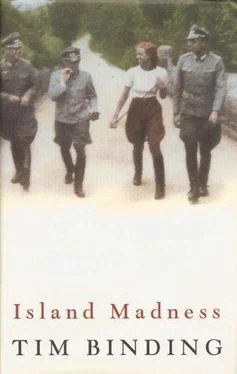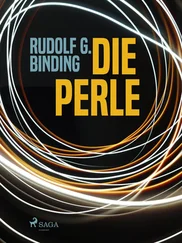“Oh, yes. She’ll have written, all right. Don’t help me none, though, do it?”
He waited while the barman laid the glasses on the table, then leant forward.
“I’ve been thinking, Ned. Did you ever think, you know, to make a run for it?”
“To England, you mean?”
“Why not? Steal a boat one night. You could make it.”
“Don’t know about that. Anyway, what about Mum?”
“I can look after your mother.”
Ned took a sip and looked at him.
“Anyone would think you want to get rid of me.”
“Dead right, I want to get rid of you. This business of Isobel. Could just be the start, to my way of thinking.”
“Start of what?”
Albert lowered his voice. “Vigilantes. A warning to the rest of us. She may not be the last. I mean there’s a lot of cement in one bag.”
“You know about that, then?”
“Wedel,” Albert said, as if the word tasted bad. “More gobble than a turkey, his tongue.”
“Well, I hope you’re wrong,” Ned told him. “Any more trouble like that and we’ll all be in hot water.”
“That’s what I mean. There’s no telling what will happen next, what madmen are stirring the pot. You should have gone with Kitty. Left us old ‘uns to it.”
“And left Mum to bury Dad?”
“I could have buried your father. It’s a brother’s duty just as much as a son’s. He wouldn’t have minded.”
“I’m not sure about that. I’d let him down, going over the water. If I’d buggered off just before his funeral, left Mum in the lurch…”
“Your mum’s known harder times than these,” Albert said. “But she got on with it. We knew how to live then, knew what’s what. All this island can do with a scrap of decency these days is funerals. And there’re plenty of them.”
“Well, there’s another one now.”
“Aye. Mrs H. will be in charge, so I’m told.”
“Oh? She didn’t seem that bothered to me.”
Albert swirled the beer at the bottom of his glass. “You got a lot to learn, Ned. That’s just the way she were brought up. Inside’s a different story. How’s he taking it, her father?”
“He hasn’t been seen all day. Left the house this morning and vanished in a puff of smoke. The Major’s going potty.”
Albert finished his beer.
“Don’t you worry about van Dielen,” he said, signalling for another. “He’ll come back.”
But he had not come back, that strange little man. It was days later, when the hue and cry had been taken up not simply by Ned’s ill-dressed cohorts, but by the whole trembling island, that tales of his sightings were delivered piece by piece to Ned’s office or, when he was not there, to the station below where Tommy bent over the counter like a schoolboy at his desk, placing his arm across the report sheet in a vain attempt to hide his near illegible hand. Many had seen him in his deerstalker hat and his Norfolk jacket, flapping at the sides, standing on the half-finished gun emplacements, climbing down the steep coastal paths, his small figure, dark and bent, as recognizable as that of the stick-twirling Hollywood tramp, gaining attention by his very avoidance of it, seen but not intruded upon; not by the soldiers scanning the horizon standing next to their Flak-30s as he paced the newly dug concrete fields testing their vulnerability with a prod of his gnarled stick, a present it was said from Dr Todt himself; not by the motorcycle patrols brewing up their lunchtime billycans while they watched his silhouette clambering over the lattice work of newly laid reinforcing rods; not by the weary clusters of labourers who leant over their spades, thankful for the brief respite, while he jumped down into the fresh-dug trenches and shored up excavations, inspecting the depth and quality of their exhaustive cultivation; not by the Spanish Republican engine driver, sweating behind his black-belching Henschel which pulled the crates bearing the van Dielen mark from St Sampson’s harbour to the western coast, who raised his cap when he had first seen him at early morning light, down at the docks, looking out to the entrance through which he and his family had first arrived; not by the islanders on their way to morning service, processions of the faithful and the converted, who caught sight of him hurrying down the lanes, and who heard the news walking up those consecrated paths, who took it inside and passed it along in the sideways shuffle of the pews, whispering the deed as they rose from their uncertain prayers, some even scribbling the dread message on the back page of a prayer book before holding it out to their neighbour’s troubled eyes. Murder? Aye, Murder, coughed behind handkerchiefs and sung tunelessly alongside Wesleyan rhymes; murder placed on the horsehair cassocks and proffered wafers and mouthed by silent lips in the hollow echoes of a sermon. Murder half-concealed and half-bred and brought half-awake blinking out into the morning light, to be passed from islander to islander, the word and the wind scattering their faith once more; murder of their own kind buttoned under their coats, murder a street away, hidden under their hats, murder of a young daughter stuffed under the benches of the horse-drawn bus and taken to town to be fed to the seagulls pecking along the promenade or tapped out by faltering fingers on the wrought-iron benches circling the empty bandstand in Candie Gardens, where the day before the band from the Luftwaffe had played tunes that Jack Hilton and Lilly Harvey had made famous all over the cracked continent. All that day did van Dielen trudge, hopping from place to place, as he might on any other normal working day, waving his pass with its picture and his honorary rank and letters of authorization slipped inside, examining pit props in the tunnels over at La Vassalerie, harassing a nervous and flustered George Poidevin in another examination of the yard, stamping along the wide northern bays, looking out to the forbidden coast beyond. He was solicitous to those he did meet, enquiring almost as a matter of politeness as to the set of the concrete or the camber in the excavations, for it was always the materials with which he was concerned, whether the cold or the heat or some other variable had compromised their quality, and when he questioned those responsible he asked them as a visiting doctor might question a patient’s relatives, interpreting their layman’s replies while forgiving them their foolish ignorance. Those he spoke to thought no more of it, for the news of his tragedy had not travelled then, though it seemed to follow him in his wake like the draw of a great ship, churning the settled ground of occupation for the scavengers to wheel about in heady excitement.
Ned thought he would show up on Monday, but he did not. Tommy was sent back to patrol outside the house. Ned waited in his office. A light rain settled. Halfway through the morning Ned put on his waterproof and walked over to the construction yard. He could see where the foreigns had broken in on Friday night. The fence had been kicked in not a hundred yards from a harbour checkpoint. Ned stepped in through the little door set in the high double gates. In the middle of the yard stood a small hut raised a few feet off the ground, lengths of raw wood arranged by size to one side, bundies of iron rods on the other. On the ground around a strewn, slippery chaos; boxes with their sides smashed in, machinery parts in junked heaps, a dented wheelbarrow jammed with half-opened packets of nails. George Poidevin stood on an untidy stack of wooden crates, levering open their lids with a length of flattened piping. Eleven thirty in the morning and he was making hard work of it. Ned picked his way over.
“I need to see your boss,” Ned called out. “You seen him about?”
George wedged the pipe in the crack and clambered down.
Читать дальше












